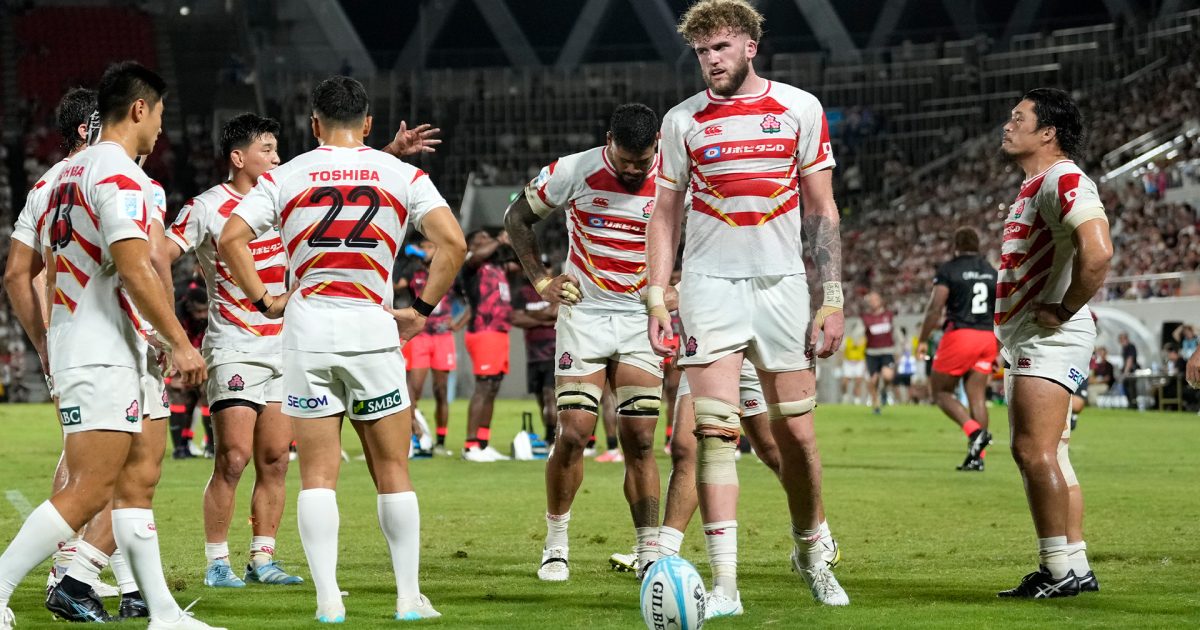Pacific Nations Cup births new era for Brave Blossoms

The Asahi Super Dry Pacific Nations Cup final proved too tall of a peak for a young Japan side in Osaka, falling to a Flying Fijians squad who lived up to their name in a 41-17 title-winning effort.
Since last year’s Rugby World Cup, both teams have undergone changes at the helm. Fiji, now under Mick Byrne and Japan, now under Eddie Jones both assembled squads primarily focused on younger players in preparation for the 2027 World Cup. Although the teams were in similar situations, their outcomes were starkly different.
Fiji’s squad was built around players from Super Rugby’s Fijian Drua. The team had a strong foundation, combining powerful contact with fluid passing and running, all while maintaining discipline. This proved a recipe for dominance.
Tactically, they were sound as well. Expecting Japan’s fast-paced play in the first 20 minutes, Fiji used their physical strength to push their opponents back. Although Japan managed to hold them off in the first half, the hosts’ legs slowed in the second half, and Fiji widened the gap late in the game.
“At half-time, I knew we could win. With our medical team and strategies, Fiji has world-class staff. We had full confidence in our fitness levels,” said Byrne, Fiji’s head coach.
Japan’s head coach Eddie Jones also acknowledged the team’s lack of ability and said whether it was set-pieces, breakdown contests, or aerial battles, Japan had no advantage in any area.
However, Japan did show progress from the matches and training they’ve had since their game against England in June.
Jones vision of “Cho-soku rugby” began to take shape in the PNC semi-final against Samoa. Notably, the coach moved Seungsin Lee from fly-half to fullback and put 34-year-old Harumichi Tatekawa in the No. 10 jersey.
Scrum-half Shinobu Fujiwara, fresh of his international debut earlier this year, played a crucial role in decision-making around the rucks and passing speed, moving the team forward. The combination of Tatekawa, Fujiwara, and fullback Lee worked well in the Samoa match, forming a solid game-management trio.
The team were also growing in confidence. Tomoki Osada, who became an essential player at both centre and wing after joining the national team at 23 years of age last year, spoke the day before the final.
“In the June match against England, I didn’t know what to do within the framework of Cho-soku rugby, so we just played fast. But with each game, I became clearer on the decisions—whether to kick or change the pace – and I gained confidence that this style works.”
Although the final score was lopsided, the game was tightly contested for about 60 minutes at 10-10. If Japan can extend that period of competitiveness, Eddie Jones’ goal of reaching the semifinals of the 2027 World Cup becomes more realistic.
However, there are concerns.
In the 11th minute of the second half, fly-half and captain Harumichi Tatekawa was replaced by Junta Hamano, who earned his first cap, and Lee moved from fullback to fly-half.
Hamano was on Jones’ radar from the beginning but was called up last minute as an injury replacement, joining the squad just a week before the match. Jones explained the reason for the substitution post-match, saying, “I wanted to increase the tempo at that point in the game.”
However, after the substitution, the backline, now without the veteran, noticeably lost momentum. Lee, who was fatigued, couldn’t play to his strengths. When Tatekawa was on the field, Japan were able to attack at a faster pace.
The substitution came at a crucial moment with the score tied at 10-10, a decision that clearly influenced the game’s momentum. The question remains; did Jones prioritise giving the young Lee more experience at the expense of the result?
Another concern is Japan’s upcoming slate of games. Japan will face the All Blacks on October 26 in Japan and then travel to play against France and England in November. In the post-match press conference, Jones was asked whether veterans like Michael Leitch and Kazuki Himeno would be called up for the next squad. Jones responded strongly.
“As I’ve said many times, the last World Cup squad was old. The job I’ve been tasked with this time is to develop a new squad.”
He even threw the question back to the media: “Do you dislike young players? I’ve said it over and over again—our biggest challenge is discovering young talents. If my philosophy hasn’t come across, I apologise. I’ll say it again a hundred or a thousand times – we need a new squad.”
Young players from Japan Rugby League One have been chosen appropriately, and they are steadily gaining strength in the Test arena. However, rugby is a game where younger players develop by learning from more experienced members. Overly prioritizing talent development could lead to a situation similar to when Jones was in charge of the
Wallabies.
A new Japan squad will be announced in mid-October. Will we see the names of legends like Michael Leitch?





































